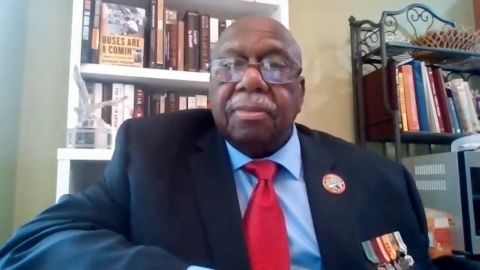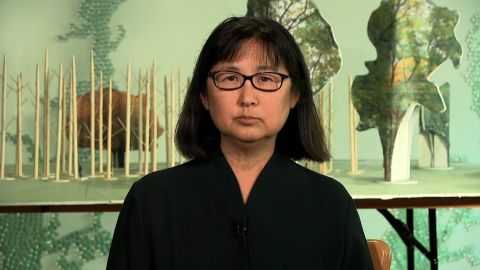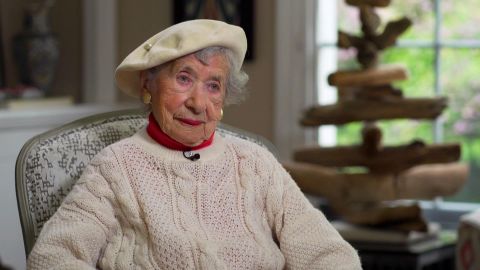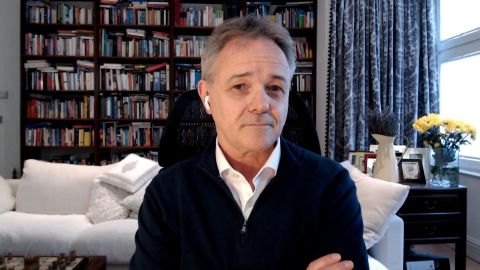Read Transcript EXPAND
CHRISTIANE AMANPOUR: This week marks the 60th anniversary of the Freedom Riders who
fought to desegregate the south. At 18, Charles Person became the youngest member traveling from Washington to New Orleans in 1961. His new memoir,
“Buses are a Comin’,” details the bravery of these men and women instrumental in the battle for civil rights. And here is Michel Martin
speaking to him about his message to young people who are continuing that struggle, even today.
(BEGIN VIDEOTAPE)
MICHEL MARTIN: Charles Person, thank you so much for joining us.
CHARLES PERSON, ORIGINAL FREEDOM RIDER: Thank you for having me.
MARTIN: How did you decide that you were going to apply to be a Freedom Rider?
PERSON: They must have had a very intensive recruitment process because only application and, you know, especially if you’re under age, you had to
get your parents’ permission. Also, they evaluated not only your experience as a freedom fighter but other things, other intangibles. And the reason I
say that is that they wanted to make sure that your background was such that nothing about your derogatory could be used not only against you but
against the movement because then that would be a distraction.
When you had an arrest warrant, they wanted it because you were protesting segregation, not because of something else that you may have done or said.
PERSON: But why did you want to go?
PERSON: It was an opportunity to do something beyond Atlanta. Atlanta was just a local. And I knew we were successful there. But here was an
opportunity that I could affect a greater reach because we knew we were going to travel throughout the south. And we knew that — we had heard that
Alabama and Mississippi were a whole lot worse than Georgia was.
MARTIN: You were just 18. You were the youngest person who was selected from this first two buses. The first 13 people to board two buses in
Washington, D.C. With the goal of challenging the continued segregation of buses and trains and airplanes starting in May. At this point, it was
already illegal but it was still being practices. The route was to go through North Carolina then to, what, South Carolina and then to Alabama
and Mississippi like that was the plan, right?
At what point did you realize it was going to get bad?
PERSON: Things began to get worse when we got to South Carolina. And we had two incidents in South Carolina where John Lewis had won and then they
were attacked. In another town called Spy (ph), Hank Thomas was arrested and bled out in the dead of night into a (INAUDIBLE) when he was able to
escape.
So, things had begun to get tense. And we talked about it that, you know, be prepared. And when we got to Atlanta, we had a nice help with Dr. King
and he was warning us to — he had heard the danger awaited us in Alabama and he said that, the word is that you guys will never get through Alabama.
Now, we respected Dr. King but, you know, we had a job to do.
So, then, next day was Mother’s Day, everything was wondering until we got to the Georgia Alabama Line. And when we got there, a gentleman was getting
off the bus and what he says to me indicated that, things may get a little more difficult. And basically, he says to me — and I see was always the
first one as you get on the bus and he says to me, he says, you (INAUDIBLE) have had it good here in Georgia, but you’re in Alabama now.
So, you know, that kind of perked my ears up. But then, again, I say, well, he’s getting off the bus. But little did I know in a couple of hours I
would see him again in Birmingham. But that’s the first indication that maybe something was awaiting us in Alabama.
MARTIN: Did you have a sense of what you were facing? I mean, you’ve alluded to it. But did you have a sense of what was going to come?
PERSON: I think our anticipation of violence towards us was basically they might (INAUDIBLE) off the stew. They might squirt condiments on you. They
might spit on you or they might even put a cigarette out on you. But that was about the extent of dangers that we anticipated. Nothing beyond that.
But we had no idea that the Klan had other things in mind.
MARTIN: And what did they have in mind?
PERSON: They wanted to kill the Freedom Riders. And possibly if we had traveled at night, they probably would have. Because people reported they
had all sorts of weapons and some of them had guns. And, you know what they set the bus on fire and what they were chanting while the bus was burning,
it’s obvious what they had in mind.
Many of them had just returned from the church. This was Mother’s Day, which is a very unique day in American life. But they really were intent on
doing extreme damage to us. You know, they were no brains on them. They had 15 minutes do whatever they want to and took advantage of it.
MARTIN: So, the first bus got to, what, to Anderson (ph), right?
PERSON: Yes.
MARTIN: And then the first bus was firebombed, correct?
PERSON: Right.
MARTIN: And then the second bus, what happened? You were on the second bus and then what happened?
PERSON: Well, when we got to Anderson (ph), the bus station was closed. It was just kind of unusual from upper state and there were a small crowd,
milling round (ph), outside the door of the bus station. The bus (INAUDIBLE) talks to them and he gets back and he says, I understand the
gray (INAUDIBLE) bus has been set afire and they’re taking the occupants to the hospital while the car loads.
Now, we knew that our friends were on that bus, but not having the technology we had today, we had no idea how bad they may have been. But
still, you know, even to this day, the thought of a fire on an enclosed area like that it’s just frightening to me. So, that’s our indication of
what had happened to them, the bus and also, we had — we heard sirens.
But anyway, after, they gave us an opportunity to resegregate ourselves. And when we refused to move to the back of the bus, that’s when the
Klansmen got on the bus and physically forced to us to the back of the bus. One eyewitness says they stacked us like pancaked.
MARTIN: You knew that were you there to stand your ground and not to move from your seat. But when they’re coming at you and you know that the
Klansmen are there and you know what they’re there to do, do remember what that was like?
PERSON: Well, I know that I should have been afraid, but I wasn’t and I don’t understand why. I didn’t feel any pain from the punches that they
through. I mean, I don’t understand that. I just knew that I had to remain (INAUDIBLE) and I knew that I was not supposed to kind of block their
punches or their kicks or anything like that. We were determined to be nonviolent regardless of what happened.
Yes. Like I said, if you could — I could never imagine generating that much hate from people who didn’t know what it means, who had never seen me
before, how could they become so angry to the point that they would do the things that they did simply because I was sitting in the front of the bus.
MARTIN: You know, we’re kind of in a moment where, you know, people get annoyed when a story that centers black people that focuses on a black
experience somehow turns to the experience, you know, of white folks. But the fact is that these white folks did put their lives on the line along
with you. And I just wondered if you would talk a little bit about that. I’m thinking about Dr. Bergman, Dr. Walter Bergman.
First of all, like how did you feel when you saw that like a white person is going to sit on the bus next you? I don’t even know if that had ever
happened before. And what went through your mind and why do you think they were there?
PERSON: That’s one of the questions I asked him. I was trying to figure out why are these white people helping here? Because in Atlanta movement,
we didn’t have many whites who participate. And Dr. Bergman and his wife, Frances, said, they told me, we’re going to take care of you. And they
tried.
When we were attacked on the bus in Anderson (ph), Dr. Bergman came to help us and they knocked him to the floor of the bus and began to stomp him in
his chest. And had his wife not — you know, begged them, they probably would have killed them on the bus. Then when we got to Birmingham, James
Peck and I, we were the designated testers.
And so, when we were into the station in Birmingham, the entire wall of men came towards us and they attacked James and he when down almost
immediately. And I was younger. I was able making my balance. But what we didn’t know at the time, Dr. Bergman was headed over to the terminal to try
to help us and he was knocked down. And Dr. Bergman is 61 years of age. And here he is crawling on his hands and knees trying to help us. You know, he
didn’t have to be there in the first place. And I can never forget, you know, to me, then 61 who seemed like a very old very old man, it doesn’t
seem like an old man today.
But, you know, (INAUDIBLE) comparison on my age to his and to see him on his hands and knees, crawling to try to help this black kid and is — you
know, it was just — it’s beyond imagination.
MARTIN: You talked about in the book, and this is a really painful part of that, is that you talk about them straining aboard the bus, you talked
about them sort of punching you in the face, grabbing your tie, your first — you know, punching you in the face and throwing you and Herman to the
back of the bus. But one of the points that you make is that half of them really focused on your two white colleagues, Jim and Walter. You said two
Klansmen held Jim’s head in their hands and a deliberate hit after hit.
Here’s what you said, you said, I’ve never been punched in my face. But as violent as that was, the man amplified their fury even more toward these
two white men you in the view of our attackers were betraying white values.
What does that mean? How do you even think about something like that?
PERSON: They didn’t like what we were doing but that (INAUDIBLE) would support our cause that they would — their theory would be increased even
more to less. But I guess the intensity of their hate and the words that they use to describe Dr. Bergman and James Peck. You know, it’s just that
they hated us but I think they hated them even worse because they were they felt that they were being betrayed.
MARTIN: You know what I found really shocking it is that you drove, you were in shock, most of you have been beaten bloody, several of you were
unconscious at that point. There were three black doctors in Birmingham, none of them would treat you. Why?
PERSON: Well, I later learned that medical doctors are licensed by the state and then I guess we were called outside agitators. And they didn’t
want to be associated with these outside agitators and possible lose their licenses. And I’ve never talked to any of the doctors since then. But I
understand now. But thank God there was a nurse in (INAUDIBLE) Congregation who did provide some medical treatment for me.
MARTIN: How did you get out of there?
PERSON: You know, faith is a wonderful thing. There was a carpenter (ph) there and he snapped a picture. And when the flash went off, it startled
him and if you see the picture, they all look up at the cameraman, they simply let me go and they attacked the cameraman, they beat him up, they
destroyed his camera and they thought it was a film pack camera and they thought they had destroyed all film pack. But one image — and to this day,
there’s only one image out of Birmingham, and that’s the image of me being beating.
But they let you go and I simply walked away. I didn’t run. I didn’t cover up. I just walk up to the street. And then as faith would have it, a bus,
city bus, came by and I got on the bus and asked the driver to take me somewhere.
MARTIN: It is remarkable, as we said, that yours was the first ride, but rides came for months, some 400 people eventually participated in these
rides. It went on from May, as you said it started, you know, on Mother’s Day and lasted through November, until finally it was determined that the
government was in fact going to enforce the law as it was written. Was it worth it?
PERSON: Yes. Yes, I’d do it again. You know, you have to realize, there are a lot of good people in this world. And, I guess, that’s what keeps me
going. You know, I’m optimistic. I was optimistic then and I’m optimistic today.
MARTIN: I see you’re wearing your service medals. So, I do want to thank you for your service and that realm as well as the one that we’re focusing
on. You made significant physical sacrifices in the service of this country and I know that many have expressed their appreciation, as do I. But I do
have to ask, you — do you — the irony of it, that you have been so willing to put your body on the line in the service of the country when it
hasn’t, at times, offered you the dignity and the equality and the opportunity that you deserve.
PERSON: Oh, what I try to relate to people is this, that when you look at your parents and you see how hard they work for you and you know there has
to be something that’s better. And then you’d do anything.
You know, they gave you all of love and (INAUDIBLE) that you have to make back to comfort for you when your brothers and your siblings. And it’s — I
think now, how did they even do the stuff that they had to put at risk and they worked on jobs and they were there every day and their pay was
insufficient, not because they didn’t have the ability, it’s simply because the system says, this is what they are worth. This is what — and it wasn’t
just in my family. Most black men were in the same situation.
I mean, it didn’t matter what your skills were and they built a lot of these companies. I mean, they were there because they know they needed
something to keep their family going. But in despite of two jobs, my dad also did side work wherever he could get it to keep going. And that’s why I
think he died so early because he was just worn out. You just can’t do that, just year after year after year.
MARTIN: Do you have some advice or — I don’t know if you’d feel so bold as to offer advice to the generation of activists that are now in the
forefront. I’m thinking about the Black Lives Matter movement, for example. Many of the folks who are at the forefront of this movement are the age
that you were when you got on that bus. Do you think, based on your experiences, is there some advice that you would share?
PERSON: Well, first of all, I don’t think it’s my position to tell them how to conduct their march. I appreciate what they’re doing. All I would
say to them is staying on balance, stay informed, keep your community informed about what you’re doing. They need to know why you’re marching.
And you have to repeat it because if you don’t create your own narratives, other people will keep to your impatience. That’s what happens. We need
that. Old become content with things as they are, we rationalize them. But young people are impatient and they want to change. As long as we got that
out there and that kind of enthusiasm in our young people, we’re going to be all right.
MARTIN: Charles Person, thank you so much for talking with us today. It is truly an honor to spend this time with you.
PERSON: The please has been mine. And thanks for caring.
(END VIDEOTAPE)
About This Episode EXPAND
A new COVID-19 variant has emerged. Are Americans ready this time?
LEARN MORE



